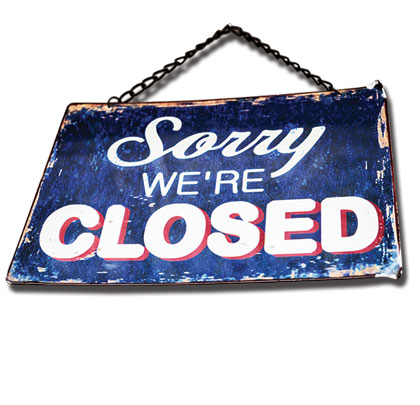You think you’re having a bad day when OSHA knocks on your door or shows up at your worksite, right? What about when OSHA shows up with a court order, authorizing them to shut down your business, permanently?
ENFORCEMENT TOOLS
It’s a little-known fact that OSHA has tools in its enforcement arsenal that can be the death-knell for a business that runs afoul of the mandatory occupational safety and health requirements for their business. This was brought home in March 2015, when OSHA announced that it had succeeded in getting a federal court (US Court of Appeals for the 7th Circuit) to ban Mike Neri Sewer and Water Contractor of Elk Grove Village, Illinois, from ever working in trenching, excavation, construction, or related work in the future. Mr. Neri, the owner of the business, is also barred from even owning construction equipment in the future.
THE ISSUE
The Neri company had been inspected and cited for numerous and repeated trenching violations. Ultimately, it was found guilty and owed OSHA $110,440 in civil penalties. OSHA reports that, during the inspection, the owner was “uncooperative” with inspectors and “refused to acknowledge trenching violations had occurred, even when shown photographic evidence to the contrary.” Neri then refused to pay the assessed civil penalties.
OSHA claims that it pursued admittedly “coercive sanctions” against Neri because of concern that the company would continue to violate OSHA trenching standards. After failing to adhere to the initial court order, Neri was found to be in contempt and ultimately was imprisoned in federal jail for nearly a month in December 2014, only being released after posting a $10,000 recognizance bond.
THE FINAL ORDER
In its February 2015 final court order, it was noted that Neri was required to attest under penalty of perjury that he was no longer in business, nor was he involved in any business engaged in trenching, excavation, construction, or related activities—quite a broad scope of business in which to be barred. The court issued a permanent injunction from “continuing or resuming, at any time hereafter, his business engaged in trenching, excavation, construction, or related activities, nor shall he create a new trenching, excavation, or construction business, nor participate in such a business as a principal, owner, partner, member, or employee.” This means he cannot even work as an equipment operator, or even as a laborer, on someone else’s construction site in the future! The injunction also bars Neri from “owning, leasing, obtaining, or in any way possessing, any excavation equipment for use in construction.”
A PERSON’S RIGHTS
The statements about Mr. Neri’s conduct that OSHA included in its press release are troubling, because it was certainly Neri’s legal right to refuse to admit to any violations, given that OSHA bears the legal burden of proof, and Neri was “innocent until proven guilty.” Moreover, because the OSH Act is a criminal statute, with power to imprison individuals if they lie to OSHA or willfully violate the law in a way that results in a fatality, Mr. Neri was also legally entitled to “take the Fifth [Amendment]” and exercise his right to remain silent and not admit to an illegal action. That his exercise of constitutional rights against self-incrimination was used to support the draconian action against Mr. Neri and his company is certainly a huge concern.
THE LESSON
Employers will need to carefully consider how they manage inspections, and certainly should never be uncooperative. But there is a difference between asserting (politely) your rights and being “uncooperative.” It is critical to understand that employers are not legally required to speak (and self-incriminate), nor do managers or employees have to sign statements that the inspector prepare. You do not have to consent to be videotaped, nor audiotaped. You do not have to perform demonstrations for the inspector, nor do you have to produce non-mandatory records (absent a subpoena).
If things get tense, consult with counsel to make sure that the rights you assert are, in fact, valid rights. The time to have these discussions is now, not when the inspector is waiting impatiently to begin his interrogation of workers and supervisors. If you delay the inspection, you can be charged with impeding, obstruction of justice, or—perhaps—just noted as being “uncooperative.” But, as Mr. Neri found out, this can also land you in prison and at the wrong end of a $100,000-plus judgment barred from engaging in your line of work permanently. ■
About The Author:
Adele L. Abrams, Esq., CMSP, is an attorney and safety professional who is president of the Law Office of Adele L. Abrams PC, a ten-attorney firm that represents employees in OSHA and MSHA matters nationwide. The firm also provides occupational safety and health consultation, training, and auditing services. For more information, visit www.safety-law.com.
_________________________________________________________________________
Modern Contractor Solutions, April 2015
Did you enjoy this article?
Subscribe to the FREE Digital Edition of Modern Contractor Solutions magazine.

OSHA Puts Construction Company Out of Business … Permanently!


